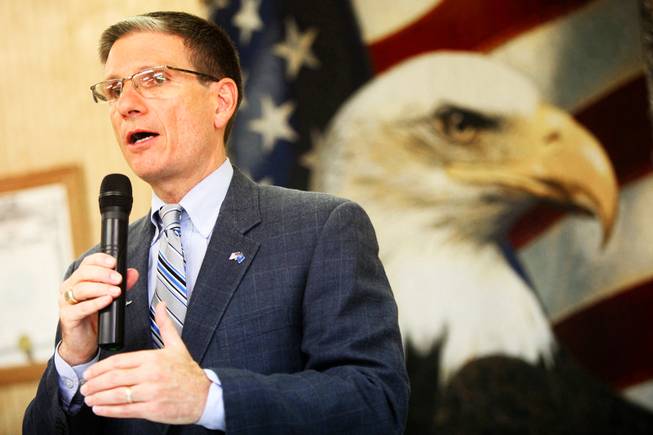
Rep. Joe Heck speaks to Veterans at the American Legion Post 40 in Henderson on Wednesday, June 8, 2011.
Sunday, Nov. 18, 2012 | 2 a.m.
WASHINGTON — Last week’s hearings with former Central Intelligence Agency Director Gen. David Petraeus have not fully cleared the air surrounding the Obama administration’s response to September’s terror attack in Benghazi, particularly as it affects the political future of Susan Rice, the United States’ ambassador to the United Nations.
At least one Nevada representative wishes lawmakers would focus on bigger takeaways from the terrible tragedy.
“A lot of attention has been paid to what happened after the attack,” said Nevada Rep. Joe Heck, a member of the House Intelligence Committee, which was briefed by Petraeus following the attack and again on Friday. “We should be talking about whether or not anything that could have been done before, to obviate the attack, or during the attack... if we really want to take lessons learned about this, that will protect against future attacks.”
Since the election, Republicans and Democrats have been arguing over whether administration officials were completely forthcoming about what they believed caused the Sept. 11, 2012, attack on the U.S. diplomatic compound in Benghazi, Libya, that left the U.S. ambassador to Libya and three other members of the diplomatic team, including one ex-Navy SEAL from Nevada, dead.
Initially, administration officials blamed an anti-Muslim YouTube video for sparking demonstrations that led to the raid on the U.S. embassy and the deaths of its personnel. But officials, including Petraeus, have since admitted that the CIA believed the tragedy was a terror attack early on. Nonetheless, while they were forming this opinion, other administration officials -- chiefly Rice -- were delivering the line about the video to the public.
“I don’t blame Ambassador Rice for the statement that she made," Heck said. "She was given talking points and she delivered them... there’s no blame to be laid for the story changing.”
Heck went on to say that his concern was more acutely focused on why it took so long for Rice and others to get the full story as it was unfolding.
“The issue is: Was the most current, up-to-date and complete information given to the American public as soon as possible, and was it given to the families of the individual that we lost?” Heck asked. “I don’t believe that the most up-to-date and and complete information was given to the American public as it was available. We understand that intelligence was an ongoing process. But the issue, for me, was: What was the timeline of the change vs. the timeline on which it was made available? Those two did not coincide.”
But right now, it does seem as though the public’s representatives are not quite ready to have that conversation.
During the presidential campaign, the administration’s line on Benghazi, and whether there was a cover-up, was a major point of contention between President Barack Obama and Republican challenger Mitt Romney. Rice has become a focal point since the election, as she is rumored to be on a short list to take over the State Department from Hillary Clinton during Obama’s second term, and would have to be cleared by the Senate for the position.
That is helping to drive the urgency around heightened Republican demands for a reckoning. This week, Republican Sens. John McCain, Lindsey Graham and Kelley Ayotte demanded Congress appoint a special investigative panel to look into the details of the Benghazi tragedy, alleging that the administration had at best, lied, and at worst, engaged in a conscious cover-up of what had happened.
Democrats, led by Sen. Harry Reid, have flatly refused, accusing Republicans in a letter of “partisan politicization of national security” and charging that many in the House and Senate had “misrepresented the facts...through a constant stream of falsehoods, exaggerations and leaks of sensitive material.”
Not every Republican has been as vocal in their disdain for the administration’s response to the Benghazi tragedy as McCain, Graham and Ayotte.
In the days since their call for a formal investigation, several Republicans, including House Speaker John Boehner, dismissed the idea of a special committee investigation, and expressed support for existing committees’ ability to conduct an official investigation.
McCain has also been roundly criticized for skipping a Benghazi briefing with the Senate’s Homeland Security and Government Affairs committee, of which he is a member, this week, on the same day as he went before cameras, demanding a special committee look into the Libyan disaster because, he said, Congress wasn’t getting enough answers from the administration.
But Heck says when it comes to the post-disaster politics, there’s really not much new to see.
The purpose of last week’s Petraeus and other intelligence briefings was to determine whether there had been major omissions or changes in what intelligence officials told Congress about Benghazi in September and what they revealed now.
“In essence there wasn’t,” Heck said.


Join the Discussion:
Check this out for a full explanation of our conversion to the LiveFyre commenting system and instructions on how to sign up for an account.
Full comments policy